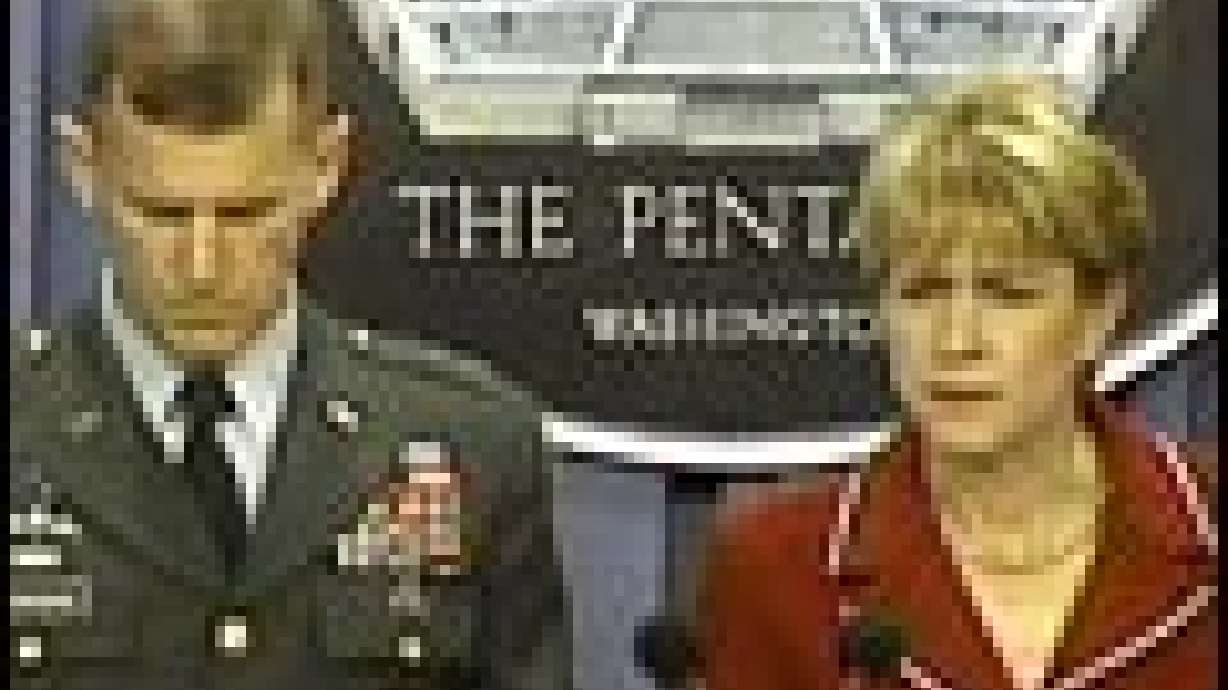Estimated read time: 4-5 minutes
This archived news story is available only for your personal, non-commercial use. Information in the story may be outdated or superseded by additional information. Reading or replaying the story in its archived form does not constitute a republication of the story.
WASHINGTON (AP) -- U.S. helicopters have begun attacking Saddam Hussein's Republican Guard forces arrayed around Baghdad, a Pentagon official said Monday.
Asked about ground forces, Maj. Gen. Stanley McChrystal said, "We have not gotten into direct firefights with Republican Guard forces." The Army's Third Infantry division moved to within 50 miles of the Iraqi capital.
He said that thus far in the war, 2,000 precision-guided weapons have been used against the Iraqis.
"All of the pieces are falling into place," McChrystal told a Pentagon briefing.
McChrystal expressed regret about a U.S. bomb that hit a passenger bus carrying Syrian civilians fleeing the war. Five were killed and 10 wounded in the incident, according to Syria's official news agency.
The general said the bomb was aimed at a bridge 100 miles from the Syrian border. "A bus came into the pilot's view too late to recall the bomb aimed at the bridge," he said.
"Unintended casualties like this are regrettable," said McChrystal, vice chief of operations for the Joint Chiefs of Staff.
Asked about the relative slow pace of Iraqi surrendering, McChrystal suggested that members of the Fedayeen, Saddam Hussein's most trusted militia, had infiltrated regular Iraqi army units, telling them to "fight or be shot in the back."
McChrystal suggested that all phases of the U.S.-British military operation were on track.
"We are on the timeline, if not slightly ahead of the schedule that Gen. (Tommy) Franks has set," he said. Franks is the commander of all the allied forces in the war.
"The tempo of the operation is controlled by Gen. Franks. Operations will occur at the time and place of his choosing," McChrystal said.
American forces chased down leads from captured Iraqis and from documents on possible chemical and biological weapons sites, but as of Monday could not confirm the presence of any weapons of mass destruction.
Asked if U.S. forces had found evidence of such weapons, McChrystal said, "We have not."
A suspicious plant captured by American troops was still being evaluated, other officials said.
Earlier, at Central Command headquarters in Qatar, Franks said, "It would not surprise me if there were chemicals in the plant and it would not surprise me if there weren't."
Franks said Monday that some sites suspected of containing weapons of mass destruction are in American control but others are not. "It's a bit early for us to have an expectation of having found" these weapons, he said.
U.S. officials are questioning two captured Iraqi generals about chemical and biological weapons, an American commander in the region said Sunday. The military also is following up on a cache of documents found by commandos in western Iraq, the Pentagon's top general said.
U.S. Central Command, which oversees the war in Iraq, said in a statement that troops were examining several "sites of interest," but that it was premature to call the plant in Najaf a chemical weapons factory.
Finding deadly chemical or biological weapons would be a coup for the United States, which says its invasion of Iraq is meant to rid Iraq of such weapons.
International opposition to the war, led by France and Germany, has focused on the view that United Nations inspectors should have been given more time to verify Iraq's claims to be free of weapons of mass destruction.
Iraq claims it destroyed all of its chemical and biological weapons and ended its nuclear weapons program shortly after the 1991 Persian Gulf War. U.N. weapons inspectors say those claims are highly suspect -- and the United States says they are blatant lies.
American special operations forces found documents in western Iraq that could lead to banned weapons facilities, Air Force Gen. Richard Myers, chairman of the Joint Chiefs of Staff, said Sunday.
Myers said U.S. commandos found the papers along with a cache of millions of rounds of ammunition after a firefight Saturday, and the discovery "might save thousands of lives if we can find out exactly where and what they have."
"I just know that they have some papers that they want to exploit as quickly as possible, and we're going to do that, of course," Myers said.
U.S. Army troops on Sunday secured a 100-acre site in Najaf that could be a chemicals factory that may have made chemical weapons, U.S. officials said. The find, first reported by a journalist from the Jerusalem Post traveling with the Army, could be the first hard evidence of chemical weapons discovered during the war.
U.N. weapons inspectors are not aware of any large-scale chemical sites that could be used to make chemical weapons in Najaf, said Ewen Buchanan, spokesman for the inspectors. However, there are many such dual-use sites elsewhere in the country because of Iraq's petrochemical industry.
(Copyright 2003 by The Associated Press. All Rights Reserved.)








